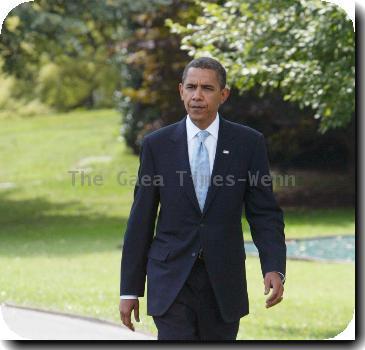Judge in Ill. sentences al-Qaida agent more than 8 years in prison, 8 years after arrest
By David Mercer, APThursday, October 29, 2009
Al-Qaida agent sentenced to 8 years in prison
PEORIA, Ill. — An al-Qaida sleeper agent who admitted having contact with the alleged mastermind of the Sept. 11 terrorist attacks was sentenced to more than eight years in prison Thursday, but could be out in fewer than six.
U.S. District Judge Michael Mihm could have sentenced Ali al-Marri to as many as 15 years. But the judge handed down the lighter sentence of eight years and four months in consideration of what he called “very severe” treatment during the almost six years al-Marri was held without charges in a U.S. Navy brig in South Carolina.
The judge’s decision could be a factor in future cases because the United States still holds more than 200 people without charge at Guantanamo Bay. If convicted, they could argue their time in custody should be considered at sentencing.
A tearful al-Marri told the judge he was sorry for helping al-Qaida and would never hurt anyone. But Mihm rejected the idea that al-MArri wasn’t capable of violence, saying by not changing course after the Sept. 11, 2001, attacks in New York City and Washington, D.C., al-Marri made it clear he intended to remain an al-Qaida.
“I believe based on everything that I have heard that you truly do not regret what you did and that you would do it again after you go home,” Mihm said.
But in a stinging critique of government interrogation techniques that included threats to have al-Marri’s family rounded up in Saudi Arabia, the judge also said he would reduce al-Marri’s sentence.
“My personal belief as a judge is that that was totally unacceptable,” Mihm said. “That’s not who we are.”
Al-Marri, a 44-year-old Qatar native, pleaded guilty in May to conspiring to provide material support or resources to a foreign terrorist organization.
He wept through his 10-minute testimony Thursday.
“I am glad I have no blood on my hand and my assistance did not cause any bloodshed or lead to that either, nor would I have ever agreed to that,” he said before asking for mercy so he could see his wife, five children and 80-year-old mother again.
He quietly thanked Allah in Arabic when Mihm delivered the sentence.
Al-Marri’s relatives heard the news at about 11:20 p.m. in Saudi Arabia. They had been hoping al-Marri would receive probation.
“I don’t know what to say,” Naji al-Marri, al-Marri’s brother, said by telephone. “Did they count the years he spent in prison?”
During the two-day sentencing hearing, defense attorneys showed videos and presented testimony to show al-Marri had endured cruel treatment — including sensory deprivation, lengthy interrogations, long periods of isolation, and threats to harm his family — in the Navy brig. In court documents, they argued that amounted to a sentence “beyond what our nation stands for and tolerates as a matter of respect for the law.”
They said Thursday that Mihm’s decision almost certainly would be cited in other cases.
“In the future, other lawyers, maybe even us, will cite this case,” defense attorney Lawrence Lustberg said.
Al-Marri is expected to get credit for time spent locked up both before and after his stay in the brig, reducing his sentence to less than six years, Lustberg said. He will be deported when he is released.
Prosecutors had argued for the maximum sentence, presenting testimony to show al-Marri is still a threat to the U.S. They have 10 days to appeal the sentence but said no decision on that has been made.
Al-Marri admitted he trained in al-Qaida camps and stayed in al-Qaida safe houses in Pakistan between 1998 and 2001. He also acknowledged having regular contact with Khalid Sheikh Mohammed, the man who the government said was the mastermind behind the Sept. 11 attacks, and with Mustafa Ahmad al-Hawsawi, who allegedly helped the Sept. 11 hijackers with money and Western-style clothing.
He was arrested in December 2001 while a graduate student at Bradley University in central Illinois. In 2003, President Bush declared him an enemy combatant, one of three held on U.S. soil since the 2001 attacks.
After the U.S. Supreme Court agreed in December 2008 to consider al-Marri’s challenge of his status, President Barack Obama ordered him surrendered to civilian authorities in Peoria, where Bradley is located.
No evidence has been shown that al-Marri had a specific al-Qaida mission in the United States, and Mihm said he doubts there was one.
Associated Press writer Carla K. Johnson in Chicago contributed to this report.
On the Net:
U.S. District Court case files: www.ilcd.uscourts.gov/media/
Tags: Barack Obama, Cases, Illinois, Middle East, North America, Peoria, Saudi Arabia, United States

